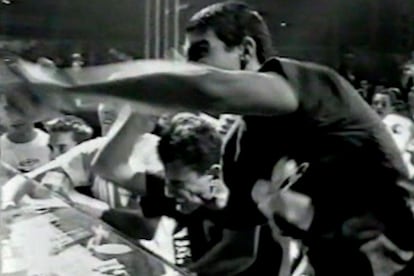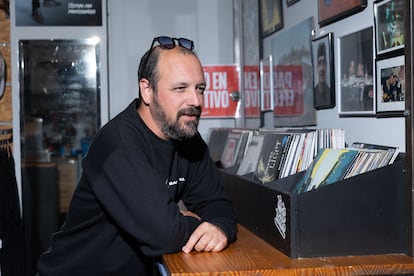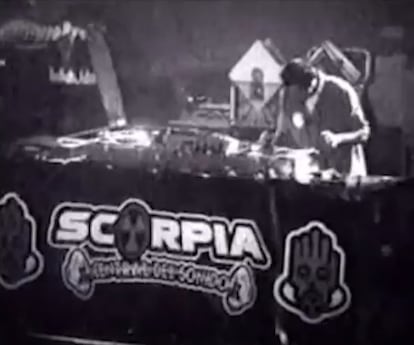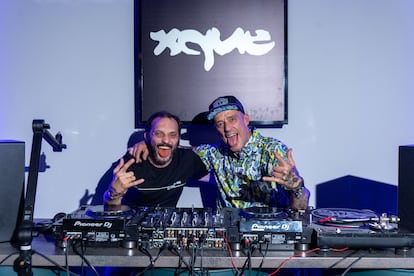David Álvarez and David Pàmies understood that they were no longer “the bad guys” when they played at Primavera Sound in 2022. At the end of their session as Pastis & Buenri —a stage name that merges their separate DJ stage names—they were approached by Pau Cristòfol, responsible for booking and programming the festival’s electronics. I wanted to congratulate you, moved by the good vibes that prevailed in that DJ. “Primavera had put 10 more goalkeepers in case they got involved. Pau, who has always trusted us, arrived full of joy: ‘It was great, everyone behaved!’” Pàmies (Buenri) remembers with a laugh, sitting next to Álvarez (Pastis) in the store. merchandising and school that they share in the Sants neighborhood of Barcelona, on one of the few free afternoons they have at the beginning of October. They don’t stop. After the interview, they will have one of their three-course courses with several students, and they have just returned from Malta, where they played with everything sold out the previous weekend.
They no longer have residencies in emblematic Catalan venues, but in a few months they will tour Latin America, this year they have passed through London and Berlin — where 20-year-old kids shouted their names in the booth saying “You’re fucking legends!” (“You are fucking legends!”)—and practically every weekend they work, up to 13 hours in a row on “good days,” at nostalgic parties remember programmed to full houses in all the rooms spread across the Peninsula, even in electronic temples in the cultural and urban epicenter such as the Apolo room in Barcelona. “We work long hours. Today’s festivals, where you play for an hour and a half, taste like little. When you get there you say to yourself: ‘But how am I going to leave now, if this is when we are all at our best?’” says Álvarez (Pastis), relieved by this rebirth of the makina sound (when written with k and not ‘machine’ indicates which is from Barcelona specifically). A new life freed from the social criminalization and moral panic that accompanied the scene during its heyday in the nineties.
Embraced by generation Z for what they always were, pure fun and dancing on the dance floor (“young people today no longer take drugs in the ritualistic way they used to, there are many people who come to dance naturally, they don’t even drink alcohol”, says Pastis), sponsored by influential producers of the now such as Danny L. Harle, taking their place in the new mediatized consumption of club culture such as that of Boiler Room and, in the midst of filming the next documentary series that covers their career, the rebirth of Pastis & Buenri is not an isolated phenomenon.
As happened with the Valencian movement of the eighties and the bakalao route of the nineties, it seems that enough time has passed to demand respect and resignify the makina sound, the Catalan movement of the nineties. Nobody labeled it that way in its day although it existed as such for thousands of people who danced it every weekend in temple-discotheques spread across open fields on the outskirts and industrial estates throughout the territory, such as Nau B-3, Chasis, Pont Aeri , Dsigual, Central, Xque, Disco 8 or Scorpia.
The makina has left those urban margins and avoided mental prejudices to claim its cultural legitimacy through the artifacts that grant it: the documentary and the essay. There it is MaQKina, history of a subculturethe film that includes practically all the voices that made up the scene. Directed by Óscar Sueiro, Àlex Salgado and Daniel Boix, it passed through the In-Edit Festival in its last edition and is already preparing its adaptation for a Sense fiction, documentary program that is broadcast on the 3Cat channel. Or the essay Party (KO Books, 2024)by Asier Ávila, where, among other phenomena of youth dance music from other parts of Spain, the splendor and decline of the Catalan sound is collected with a social, historical and political context in line with what it was, at the antipodes of classism and the broad media brush that ignored him in his time.
A distorted image
“That distorted image still remains in the heads of many, that that scene was a pillbox thing.” peel off violent – as skinheads were popularly called in Catalonia in the nineties – but that must have represented 3% of the total. In reality, this was always a very massive and transversal party, with people from all social strata and origins. We are talking about many big clubs filled every weekend with tens of thousands of people inside at each session,” clarifies one of the directors of MaQKinaÀlex Salgado, who accompanies Pastis and Buenri in the interview and who has become one of the key chroniclers in understanding this phenomenon.

After winning awards with the documentary Citizen Fernando Gallego: Dance or Die, about the figure of Nando Dixkontrol (2018, available on Filmin), and broaden your vision with MaQKinaSalgado and his team are filming a documentary series about Pastis and Buenri. He has captured them in their homes – Álvarez is the father of a 19-year-old girl and Pàmies of a 24-year-old young man -, on tour in Spain and in European venues. “They are a creative couple with a unique energy and an impeccable technical level. If they were English or German, they would be known worldwide, but TikTok and others had to arrive to put them back on the map,” reflects this sociologist turned documentary journalist.

Dance or die
More than 30 years have passed since the son of a banker and a hospitality worker from Girona (Pastis) and the son of a Ufesa salesperson and an appliance saleswoman from Premià (Buenri) met at 16 years old while dancing with their children. of counselorslawyers, students or hustlers. They were regulars at the anarchist party that Nando Dixkontrol put on at the Barcelona Psychodrome. In that place on Almogàvers Street that had “dance or die” painted in the bathrooms (a translation of the English “rave or die”, which was Dixkontrol’s war cry) the preambles of a scene of total evasion were cooked up, but above all fun and highly danceable, free from the ordinances of civility and Barcelona poses not pretty that would end up dooming the youth party in the center of the city.
At the Psychodrome, the place that Joan M. Oleaque would describe in Ecstasy (Barlin Libros, 2004) as the place where “the crowd threw themselves on the ground, punched the walls and ended up bursting. Because that’s what it was about: making everything explode right there,” we began to hear that sound that the Catalan producers created and that local DJs would later popularize in large venues on the outskirts of Barcelona with emotional songs sung with female voices. One of the many successes of MaQKina is to include the singers Marian Dacal and Eva Martí, because with the exception of Monica
Those accelerated songs to accompany the rush of ecstasy and to dance with arms raised and hum in communion would later resound in the Catalan industrial estates. The urban hygiene of post-Olympic Barcelona and a push that made morning parties illegal in 1994 caused this pilgrimage of young people from all over Catalonia to rooms converted into temples and with very particular cults defined according to their respective residents. A beat that would be summed up with a stellar moment that collects MaQKinaand in which Pastis is heard shouting, at that time, in Catalan and from the booth: “This song is dedicated to Jordi Pujol: Let’s see if you burst, because because of you we can’t go to the party!”:
The mystique of disenchantment
The collective party, dancing to the makina sound, implied occupying a practically mystical, communal place. Young people felt like they belonged on the weekend because from Monday to Thursday the system made them feel like they were anything but special. “The Olympic hangover is that of the jug and the horse. Society is very broken and there is an incredible crisis in Spain. Young people had very few prospects. The images of the Inem queue, with the triggered unemployment and the corrupt politics of the PSOE, generated a lot of disenchantment. People lived for the weekend. It was a way of life, an aesthetic, with a very particular associated language. There were no problems on the track. People went to dance and have fun in brotherhood with their friends,” says Salgado.

Asier Ávila, author of Partyhighlights that something distinguished the young people who filled those industrial estates in the mid-90s from the heirs of guitars and techno who danced at the Psychodrome at the beginning of the decade. “The machinists of that time had absorbed electronics from the mainstream. Chimo Bayo, with That’s how I like it, exploded at the end of 1991, the original machine also evolved and became something different,” he explains.
The maxi-cosi generation
Criminalization came with skinhead fights and hospitalizations. The football ultras and neo-Nazis landed in the nightclubs. They took up little space, but they made a lot of noise. In 1995, Justo Muñoz died outside a pizzeria that functioned as a after just outside Pont Aeri. His death came after that of Jordi Domenech at Gran Velvet, another large venue in Badalona. “There was a very aggressive, very hard vibe, it was a scourge for us,” Buenri recalls.
With violence came bad press and little by little, with the hyper-commercialization of a sound that was distorted by a corporate desire that led to practically infantile levels of consumption (there are grotesqueries like The Makin Smurfs), the phenomenon went out. The rebirth would come with the pandemic and with the nostalgic withdrawal.
“We always say that now we have the maxi-cosi generation, who are the ones who listened machine in their parents’ cars as babies and now they dance it with them in our sessions,” says Buenri. No one sees a fight anymore when it rings The First Rebirthone of the mythical ones that never fails in its sessions. “Now the dodgy people are in the booths of the most select places,” Buenri adds with a provocative wink.
Both he and Pastis know that young people can no longer spend three days of partying because there are no longer venues to accompany them, but something in their sessions remains unbeatable and immutable: “The makina is fun,” says Pastis. And Buenri, like those couples who have learned to finish each other’s sentences, concludes: “When someone is down, I always say the same thing. Come to one of our sessions and give it your all, because that is also therapy, and on top of that, a good one.”

Babelia
The literary news analyzed by the best critics in our weekly newsletter
receive it



